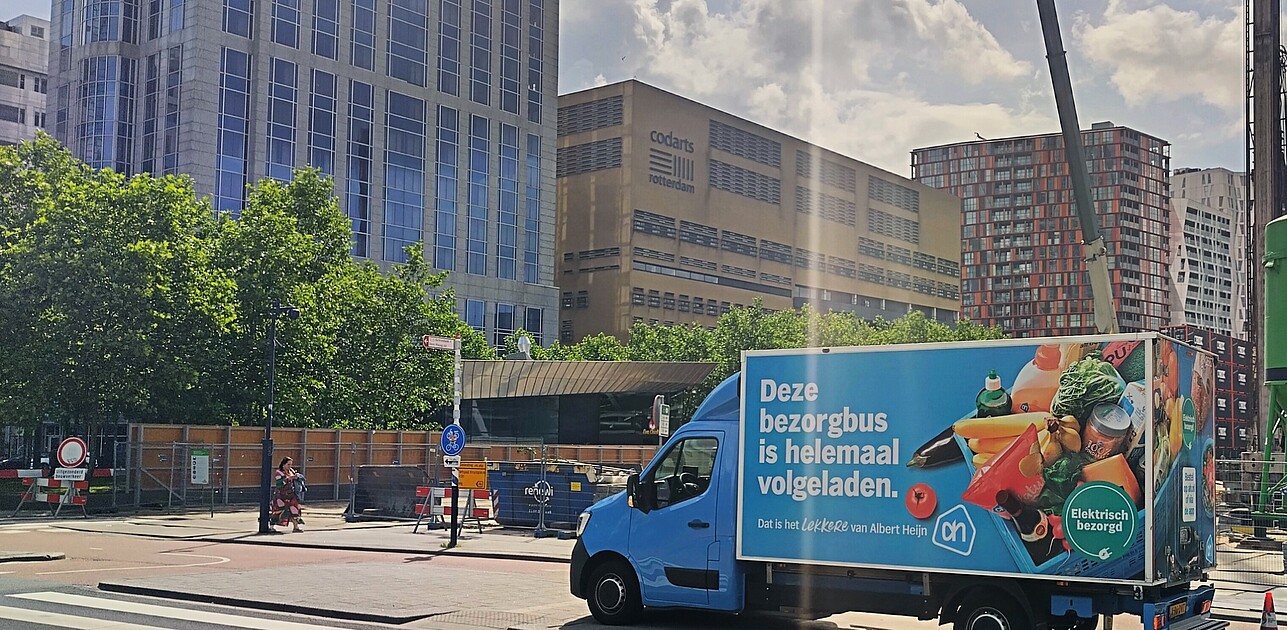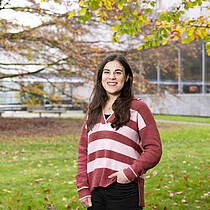

Article: Friday, 17 October 2025
It’s so convenient to choose a delivery time slot for supermarket deliveries – maybe you want between 19:00 and 21:00 on a Friday evening so you’re all set for the weekend. As soon as you place the order, the supermarket’s delivery service starts working out how to fit you into its delivery schedule. The process has come on a long way in the last couple of decades but there are still improvements to be made. PhD candidate Liana van der Hagen has explored how supermarkets can use machine learning to handle delivery time slots more efficiently. She developed a model that can instantly predict whether a new order will fit into the existing schedule when she worked In collaboration with the Dutch software company ORTEC and the CILOLAB living lab project for sustainable urban logistics. She successfully defended her PhD thesis, Machine learning for time slot management in grocery delivery, at Rotterdam School of Management, Erasmus University (RSM) in March 2025.
For you to get your groceries in time for the weekend, the software must decide right away whether your order fits into the planning, and if delivery drivers can still reach all the other customers within the time slots they have already been promised. Ideally there will be no unnecessary or half-empty vans on the road – and all of this has to be calculated for the customer almost instantly when the customer selects their time slot. Making this process as efficient as possible was the central question in Van der Hagen’s PhD thesis.
In practice, delivery services often check each new order against the existing route plan without recalculating the entire system. As a result, customers are sometimes wrongly rejected and vehicle capacity is left unused.
In an ideal world, all possible combinations would be recalculated to find the best possible routes, but that’s an extremely complicated calculation and could take hours. “The customer doesn’t want to wait. They want to know right away which delivery slots are available,” says Van der Hagen.
She tested a new approach in which machine learning is used to determine within milliseconds whether an order still fits the schedule. She trained an AI model with thousands of simulations of customer requests, enabling the system to recognise patterns and predict whether a delivery slot is feasible.
“We let the model learn from the best possible route plans and use that knowledge to evaluate new requests quickly,” she explains. “That makes the system much faster while still maintaining high accuracy.”
The potential benefits of this approach are substantial. Delivery vans could be fuller, more customers could be served per trip, and the process could become both more sustainable and more profitable.
Many delivery services currently operate at a loss, and in such a low margin sector like supermarkets, every improvement counts. Van der Hagen explains: “You could serve more customers with the same number of vehicles, which saves both costs and emissions.” Her analyses show that supermarkets could plan delivery routes up to 18 per cent more efficiently with this model.
For Van der Hagen, the appeal of the research lies in working on a tangible, socially relevant problem. She deliberately sought a PhD project involving practical partners. “I didn’t want to build a theoretical model that ends up in a drawer. I wanted to create something companies can actually use,” she says. The collaboration with ORTEC provided exactly that link between academia and practice. “And I simply enjoy puzzling over these kinds of problems,” she adds.
At present, her model mainly predicts whether a slot is available. Van der Hagen stresses that a logical next step is to also factor in the costs of delivery moments and give a discount in some cases. “Some slots are more sustainable, for example when several customers in the same neighbourhood are already scheduled. Those are the ones you want to promote,” she notes.
Further work with behavioural scientists and partners like ORTEC may result in the delivery system being able to nudge customers towards the delivery time slots that make the system more sustainable, Liana van der Hagen believes. Her supervisor Niels Agatz, Professor of Last-mile Supply Chain Analytics at RSM and scientific director of TKI Dinalog, a Dutch institute for logistics innovation, was also involved in earlier research that showed customers are receptive to such incentives.
The model has not yet been implemented in software systems, but the research demonstrates what is possible. “It is a proof of concept showing that machine learning can make these decisions much faster than the traditional methods,” says Van der Hagen. Other companies are already showing interest, though it is not yet in daily use. “There are still steps to be taken before it can be rolled out in practice, but the potential is certainly there.”
Liana van der Hagen is currently a postdoctoral researcher in the Zero Hunger Lab at Tilburg University, where she applies data science to address global food security challenges.
Postdoctoral Researcher at Zero Hunger Lab, Tilburg University

Learn more about how machine learning can make grocery delivery more efficient here: Machine learning for time slot management in grocery delivery


Science Communication and Media Officer
Rotterdam School of Management, Erasmus University (RSM) is one of Europe’s top-ranked business schools. RSM provides ground-breaking research and education furthering excellence in all aspects of management and is based in the international port city of Rotterdam – a vital nexus of business, logistics and trade. RSM’s primary focus is on developing business leaders with international careers who can become a force for positive change by carrying their innovative mindset into a sustainable future. Our first-class range of bachelor, master, MBA, PhD and executive programmes encourage them to become to become critical, creative, caring and collaborative thinkers and doers.
